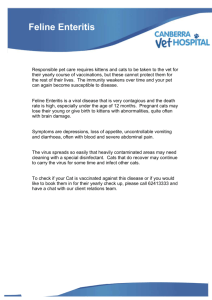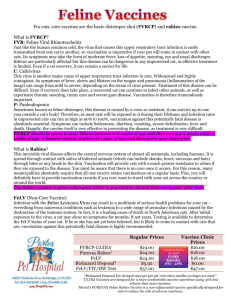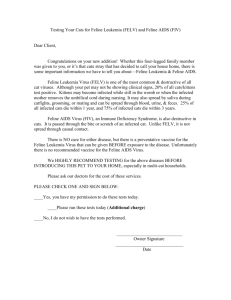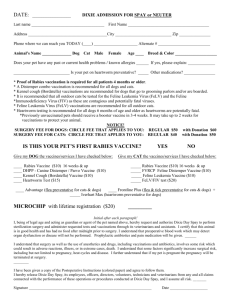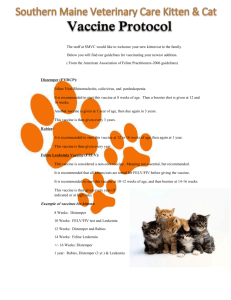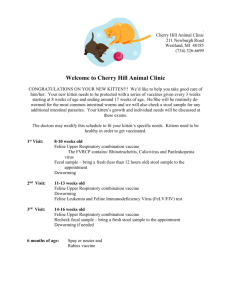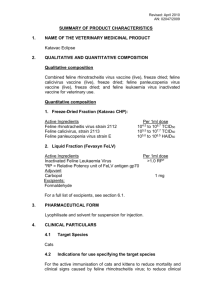Feline Vaccination - Northampton Veterinary Clinic
advertisement
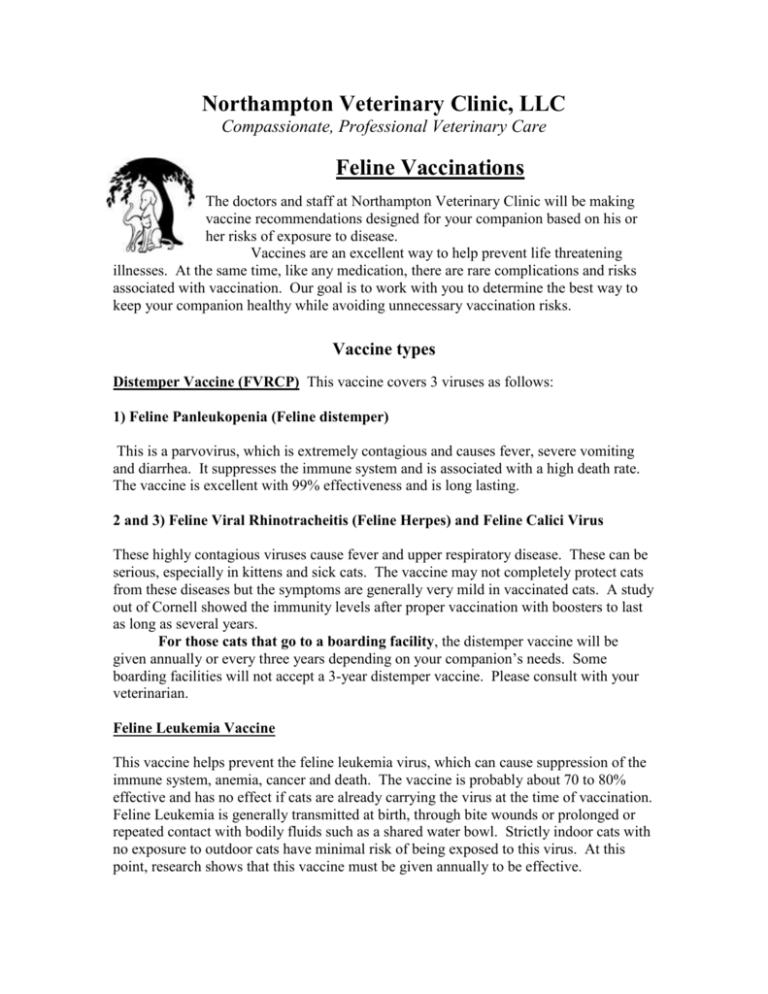
Northampton Veterinary Clinic, LLC Compassionate, Professional Veterinary Care Feline Vaccinations The doctors and staff at Northampton Veterinary Clinic will be making vaccine recommendations designed for your companion based on his or her risks of exposure to disease. Vaccines are an excellent way to help prevent life threatening illnesses. At the same time, like any medication, there are rare complications and risks associated with vaccination. Our goal is to work with you to determine the best way to keep your companion healthy while avoiding unnecessary vaccination risks. Vaccine types Distemper Vaccine (FVRCP) This vaccine covers 3 viruses as follows: 1) Feline Panleukopenia (Feline distemper) This is a parvovirus, which is extremely contagious and causes fever, severe vomiting and diarrhea. It suppresses the immune system and is associated with a high death rate. The vaccine is excellent with 99% effectiveness and is long lasting. 2 and 3) Feline Viral Rhinotracheitis (Feline Herpes) and Feline Calici Virus These highly contagious viruses cause fever and upper respiratory disease. These can be serious, especially in kittens and sick cats. The vaccine may not completely protect cats from these diseases but the symptoms are generally very mild in vaccinated cats. A study out of Cornell showed the immunity levels after proper vaccination with boosters to last as long as several years. For those cats that go to a boarding facility, the distemper vaccine will be given annually or every three years depending on your companion’s needs. Some boarding facilities will not accept a 3-year distemper vaccine. Please consult with your veterinarian. Feline Leukemia Vaccine This vaccine helps prevent the feline leukemia virus, which can cause suppression of the immune system, anemia, cancer and death. The vaccine is probably about 70 to 80% effective and has no effect if cats are already carrying the virus at the time of vaccination. Feline Leukemia is generally transmitted at birth, through bite wounds or prolonged or repeated contact with bodily fluids such as a shared water bowl. Strictly indoor cats with no exposure to outdoor cats have minimal risk of being exposed to this virus. At this point, research shows that this vaccine must be given annually to be effective. Rabies Rabies virus is chiefly transmitted by the bite of a rabid animal. It is always fatal. State law requires that cats be vaccinated for this disease to protect the public. Indoor cats can get exposed to rabies if wild animals such as bats enter the home. Risks of vaccines Fibrosarcomas or other sarcomas Rarely cats will have an inflammatory response to vaccination that results in a cancerous tumor at the vaccine site. Tumors may develop months or years after vaccination. Although sarcomas are rare they can lead to invasive surgeries and possibly death. These tumors should be taken seriously. As a way to reduce risks associated with these tumors, we avoid giving vaccines all in one site and are choosing products which seem to cause the least amount of local inflammation, while still maximizing immunity. If a lump is felt at any time on a cat it should be evaluated by one of our doctors. Allergic/Hypersensitivity reactions Some cats will seem a bit off or run a mild fever for a day or two after vaccinations. There may be soreness at the site of vaccination. Risks of serious vaccine reactions in cats are rare. Certain purebreds have a higher incidence of reactions. Serious reactions that warrant immediate attention are as follows; 1) 2) 3) 4) Severe lethargy Vomiting or Diarrhea Hives, swelling in the face Difficulty breathing If not treated these reactions can result in death, so it is critical that if you have any concerns that your dog may be having a reaction that you return to the clinic immediately. After hours you should call or go to South Deerfield Emergency Hospital at (413) 665-4911 or Angell Memorial Animal Hospital at (413)-785-1221. Both of these emergency facilities are located in Springfield.
